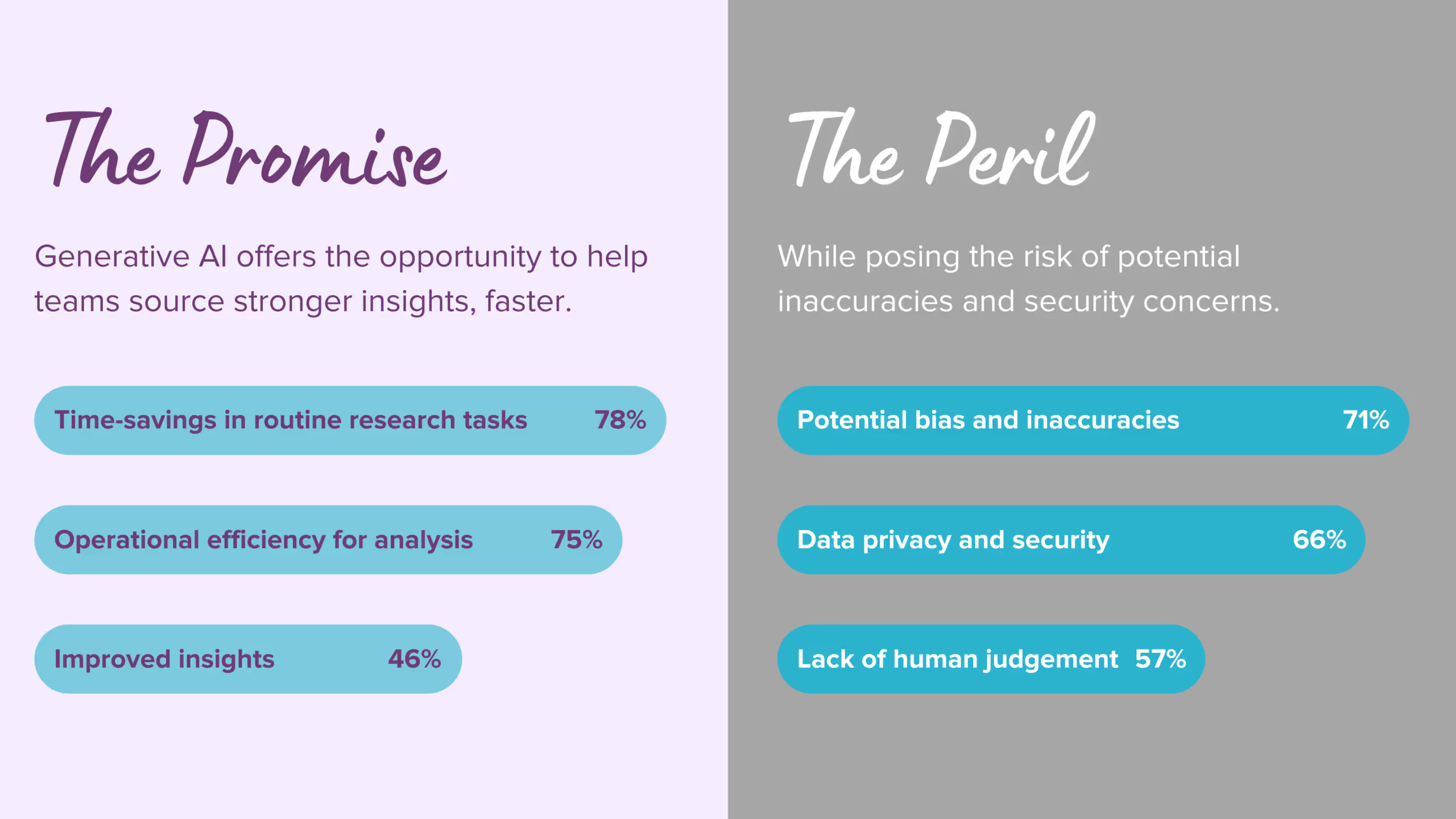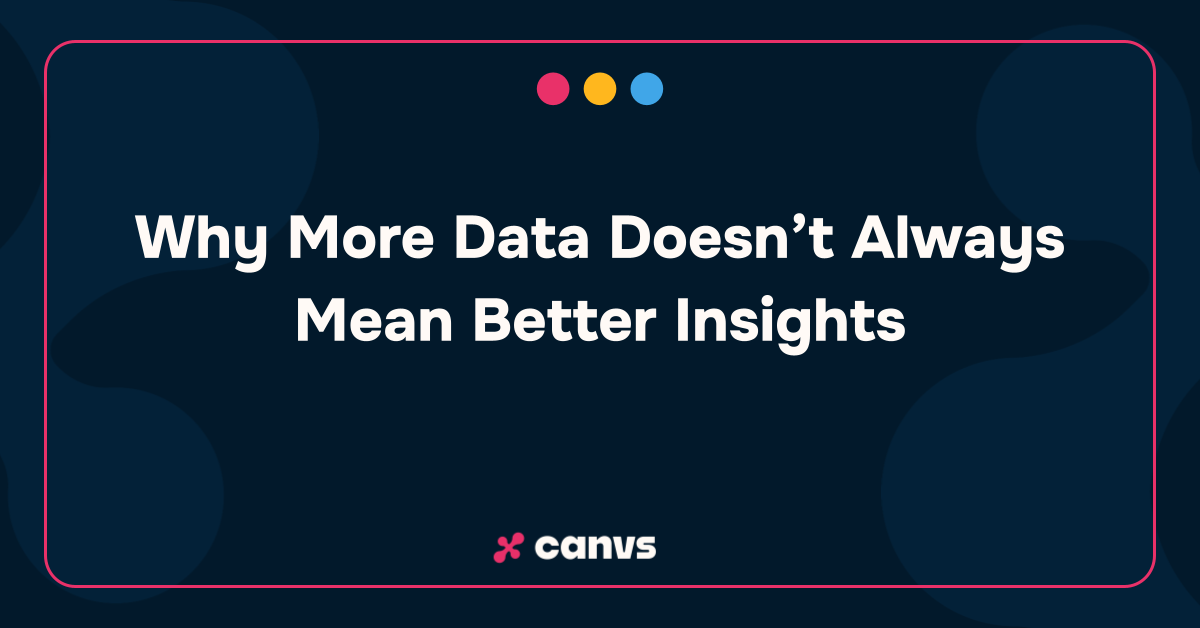I recently had the opportunity to present at ESOMAR's AI Tools showcase, which featured a panel discussion with several brand insights leaders moderated by Vensa Hajnšek, senior manager of intelligence at Swarovski. The discussion served as a touchstone for the state of AI in market research: lots of experimentation, and real promise to elevate insights and boost productivity, along with well-founded concerns about the risks posed by AI, particularly concerns with the ability to trust AI output.
The conversation brought to mind a recent survey of research practitioners by Market Research Institute International (MRII) that highlights this dichotomy vividly. On the one hand, researchers see AI offering significant time savings (78%) and enhanced efficiency in data processing (75%). On the other hand, there are major concerns about potential bias (71%) and data privacy (66%). This survey data sets the stage for understanding both the promise and peril of generative AI in market research.

Source: Market Research Institute International, “AI in Focus: Market Researchers Weigh in on Workplace Impact for Today and Tomorrow”
The Promise of Generative AI in Market Research
Time-Savings and Efficiency
Kendra Speed, Director of Consumer Market Research at LinkedIn, highlighted the time-saving benefits of AI, noting how it streamlines routine research tasks and data processing. She mentioned, "AI helps us process vast amounts of unstructured data quickly, enabling us to extract meaningful insights and identify trends that would be impossible to see manually."
Innovative Experimentation
Elise Misse, Director of Global Strategic Insights at Ricola, emphasized the experimental nature of AI in generating innovative ideas. She shared, "We're looking at ideation, human ideas, human-infused AI ideas, and AI-only ideas. Using synthetic data helps us manage these ideas before consumer research, making the process both fun and productive."
Enhanced Personalization
Jennifer Lee, Director of Strategic Initiatives at Estée Lauder Companies, discussed how AI enhances personalization in marketing strategies. "AI plays a crucial role in personalizing the consumer experience. By analyzing customer data, we can tailor our marketing strategies to individual preferences, improving customer satisfaction and loyalty."
AI in Synthetic Audiences
Adam Deis, Sr. Market Research Manager at Microsoft, explored the use of AI-generated synthetic audiences to replicate human responses in both quantitative and qualitative methodologies. "We've been developing AI synthetic audiences to get a sense of how close AI is at replicating human responses. This helps us understand consumer sentiment and perceptions more deeply."
The Peril of Generative AI
Potential Bias in AI Algorithms
A significant concern raised during the panel was the potential bias in AI algorithms. Adam Deis pointed out that while AI can work well with established content, it tends to produce "hallucinations" when dealing with less familiar topics. "The further you get from its training data, the more AI starts sourcing from the open web, leading to potential inaccuracies."
Data Privacy and Security
Jennifer Lee stressed the importance of data privacy and security, particularly when dealing with personal consumer information. "We've adopted strict data governance policies to protect consumer information and comply with regulations. Ensuring data security is paramount in our AI applications."
Over-Reliance on AI
Kendra Speed emphasized the need to balance AI-generated insights with human expertise. "While AI can automate many tasks, it's crucial to maintain human judgment in the research process. Over-reliance on AI can lead to less human involvement and potentially flawed insights."
Ethical Concerns
Elise Misse discussed the ethical implications of using AI in research, particularly regarding transparency and accountability. "It's important to question AI outputs, cross-check them with other sources, and ensure ethical standards are upheld in AI-driven research practices."
Canvs AI's High-Trust Approach
At Canvs AI, we understand the critical importance of trust in AI applications, especially in market research where the stakes are high. Insights and CX leaders are the source of customer truth in the business and need to know the evidence-based recommendations they put forward are, well, evidence based. Our approach to high-trust AI aims to balance the promise of AI with rigorous standards to mitigate its perils. The latest release of AI Story Assist exemplifies this commitment by incorporating interactive citations and instant data quantification to boost insights productivity and confidence.
An important technical nuanced in the discussion of AI data analysis is the provenance of the findings. Canvs AI has intentionally taken a closed-domain approach to ensure that AI outputs originate solely from the known source data imported by the user. This method eliminates the risk of AI hallucinations that can occur when models draw from open web sources.
Conclusion
The AI revolution is here for consumer insights, bringing with it both remarkable opportunities and significant challenges. At Canvs AI, we are committed to a high-trust approach that balances the magical capabilities of AI with the rigorous standards necessary for trustworthy insights. By prioritizing transparency, data privacy, and actionable insights, we aim to unlock the full potential of AI while maintaining the confidence and integrity essential for strategic decision-making.
My thanks to ESOMAR for hosting this highly informative discussion and providing the opportunity to move beyond AI help to actually dig into use cases, and nuanced perspectives on the promise and peril of generative AI.




